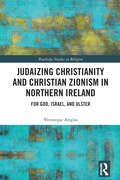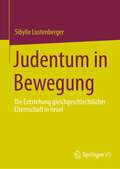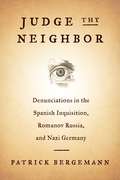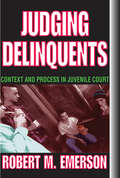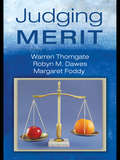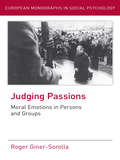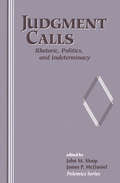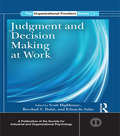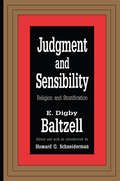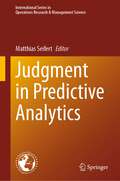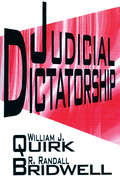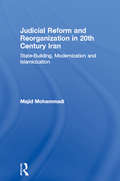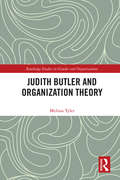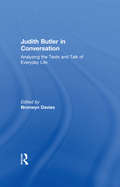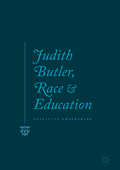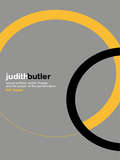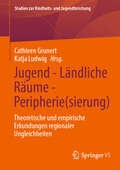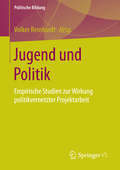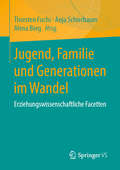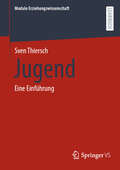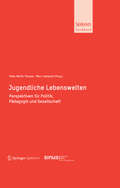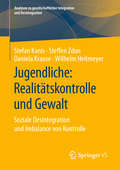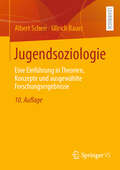- Table View
- List View
Judaizing Christianity and Christian Zionism in Northern Ireland: For God, Israel, and Ulster (Routledge Studies in Religion)
by Véronique AltglasThis book explores the contemporary Judaization of evangelical Christianity through the ethnography of a Messianic congregation in Northern Ireland. A constellation of Messianic "congregations" have expanded worldwide over recent years, combining Jewish liturgy, symbols, and artifacts with prophecies about the End Times and the return of Jesus. Increasingly recognized as a legitimate subdivision within evangelicalism, the Messianic movement has facilitated a popularization of Jewish practices and symbolism beyond its own congregations. The author considers: What insights do these congregations offer about the deregulation of religions? Is there any logic to the combinations of Christian and Jewish sources in Messianic beliefs and practices? How can we understand this fascination with Jews and Judaism? Finally, what is the political significance of Messianic relationship with Jewish people, the state of Israel, and Christian Zionism? The book will be of particular interest to scholars of the sociology and anthropology of religion, religion and politics, and Jewish-Christian relations.
Judentum in Bewegung: Die Entstehung gleichgeschlechtlicher Elternschaft in Israel
by Sibylle LustenbergerIn Israel, wo das orthodoxe Rabbinat historisch sanktionierten Einfluss auf die rechtlichen Definitionen von Ehe und Elternschaft hat, wirft gleichgeschlechtliche Elternschaft elementare Fragen auf, wie zum Beispiel, was Zugehörigkeit zum nationalen Kollektiv schafft, wer die Autorität hat, die Normen der Reproduktion zu definieren, und wo das orthodoxe Judentum beginnt und endet. Judentum in Bewegung behandelt diese Fragen aus einer transgenerationalen Perspektive, die darauf achtet, wie religiös informierte Regeln, Normen und Praktiken der Weitergabe von materiellem Besitz, Namen und gesellschaftlicher Zugehörigkeit angewendet und verändert werden. Lustenberger präsentiert eine detaillierte ethnographische Beschreibung des dynamischen Zusammenspiels zwischen Verwandtschaft, Religion und Staat und hinterfragt damit die allgemein verbreitete Annahme, dass gleichgeschlechtliche Elternschaft in einer radikal säkularen Sphäre existiert, die im krassen Gegensatz zum orthodoxen Judentumsteht. Sie nimmt gleichgeschlechtliche Elternschaft als Prisma, durch die sich die Gesellschaft als Ganzes widerspiegelt, um zu untersuchen wie sich gesellschaftliche Strukturen verändern und welche Flexibilität und Spielraum organisierte Religionen dabei aufweisen.
Judge Thy Neighbor: Denunciations in the Spanish Inquisition, Romanov Russia, and Nazi Germany (The Middle Range Series)
by Patrick BergemannFrom the Spanish Inquisition to Nazi Germany to the United States today, ordinary people have often chosen to turn in their neighbors to the authorities. What motivates citizens to inform on the people next door? In Judge Thy Neighbor, Patrick Bergemann provides a theoretical framework for understanding the motives for denunciations in terms of institutional structures and incentives.In case studies of societies in which denunciations were widespread, Bergemann merges historical and quantitative analysis to explore individual reasons for participation. He sheds light on Jewish converts’ shifting motives during the Spanish Inquisition; when and why seventeenth-century Romanov subjects fulfilled their obligation to report insults to the tsar’s honor; and the widespread petty and false complaints filed by German citizens under the Third Reich, as well as present-day plea bargains, whistleblowing, and crime reporting. Bergemann finds that when authorities use coercion or positive incentives to elicit information, individuals denounce out of self-preservation or to gain rewards. However, in the absence of these incentives, denunciations are often motivated by personal resentments and grudges. In both cases, denunciations facilitate social control not because of citizen loyalty or moral outrage but through the local interests of ordinary participants. Offering an empirically and theoretically rich account of the dynamics of denunciation as well as vivid descriptions of the denounced, Judge Thy Neighbor is a timely and compelling analysis of the reasons people turn in their acquaintances, with relevance beyond conventionally repressive regimes.
Judging Delinquents: Context and Process in Juvenile Court
by Robert M. EmersonJuvenile court has elicited the interest and criticism of lawyers, social workers, and criminologists, but less attention from sociologists. This book adds to growing sociological literature on the operations of legal institutions. It describes some critical aspects of the functioning of the juvenile court, an institution charged with judging and treating delinquents. To this end, it analyzes the nature of the court operation, the handling of delinquents, and the court's functions in relation to the wider social and legal system.
Judging Merit
by Robyn M. Dawes Warren Thorngate Margaret FoddyMerit-based tests and contests have become popular methods for allocating rewards – from trophies to contracts, jobs to grants, admissions to licenses. With origins in jurisprudence, methods of rewarding merit seem fairer than those rewarding political or social connections, bribery, aggression, status, or wealth. Because of this, merit-based competitions are well-suited to the societal belief that people should be rewarded for what they know or do, and not for who they know or are; however, judging merit is rarely an easy task – it is prone to a variety of biases and errors. Small biases and errors, especially in large competitions, can make large differences in who or what is rewarded. It is important, then, to learn how to spot flaws in procedures for judging merit and to correct them when possible. Based on over 20 years of theory and research in human judgment, decision making and social psychology, this unique book brings together for the first time what is known about the processes and problems of judging merit and their consequences. It also provides practical suggestions for increasing the fairness of merit-based competitions, and examines the future and limits of these competitions in society.
Judging Passions: Moral Emotions in Persons and Groups (European Monographs in Social Psychology)
by Roger Giner-SorollaShortlisted for the British Psychological Society Book Award (Academic Monograph category) 2014! A CHOICE Outstanding Academic Title 2013! Psychological research shows that our emotions and feelings often guide the moral decisions we make about our own lives and the social groups to which we belong. But should we be concerned that our important moral judgments can be swayed by "hot" passions, such as anger, disgust, guilt, shame and sympathy? Aren’t these feelings irrational and counterproductive? Using a functional conflict theory of emotions (FCT), Giner-Sorolla proposes that each emotion serves a number of different functions, sometimes inappropriately, and that moral emotions in particular are intimately tied to problems faced by the individuals in a group, and by groups interacting with each other. Specifically, the author suggests that these emotions help us, as individuals and group members, to: Appraise developments in the environment Learn through association Regulate our own behavior Communicate convincingly with others. Drawing on extensive research, including many studies from the author’s own lab, this book shows why emotions work to encourage reasonable moral behaviour, and why they sometimes fail. This is the first single-authored volume in the field of psychology dedicated to a separate examination of the major moral and positive emotions. As such, the book is ideal reading for researchers, postgraduates and undergraduates of social psychology, sociology, philosophy and politics.
Judging the Image: Art, Value, Law (Transformations)
by Alison YoungArt, value, law - the links between these three terms mark a history of struggle in the cultural scene. Studies of contemporary culture have thus increasingly turned to the image as central to the production of legitimacy, aesthetics and order. Judging the Image extends the cultural turn in legal and criminological studies by interrogating our responses to the image. This book provides a space to think through problems of ethics, social authority and the legal imagination. Concepts of memory and interpretation, violence and aesthetic, authority and legitimacy are considered in a diverse range of sites, including:* body, performance and regulation * judgment, censorship and controversial artworks* graffiti and the aesthetics of public space* HIV and the art of the disappearing body* witnessing, ethics and the performance of suffering* memorial images - art in the wake of disaster.
Judgment Calls: Rhetoric, Politics, And Indeterminacy
by John SloopThe concept of judgment has occupied a place of special importance in the tradition of Western thought. In antiquity and especially in the Enlightenment, judgment served as the rubric under which Western thinkers struggled to come to terms with how the world of human concerns is constituted in thought and, perhaps more important, how humans call for timely and appropriate actions. Recently, judgment has again emerged as a highly contestatory site for philosophical, rhetorical, and cultural reflection and inquiry.This book puts into contact a variety of responses to the question of judgment in a postmodern age, seeking out the question of how, once solid ground is pulled out from underneath the position of the judge, one continues to ?tread? judgment, to meet obligations while remaining afloat.The essays in this edited volume investigate judgment as a rhetorical problem to be discussed philosophically and examines the standards by which judgments are made and can be made in contemporary culture. The essays clarify the links between rhetoric and judgment as they are played out on public and meta-critical levels.
Judgment and Decision Making at Work (SIOP Organizational Frontiers Series)
by Scott Highhouse Eduardo Salas Reeshad S. DalalEmployees are constantly making decisions and judgments that have the potential to affect themselves, their families, their work organizations, and on some occasion even the broader societies in which they live. A few examples include: deciding which job applicant to hire, setting a production goal, judging one’s level of job satisfaction, deciding to steal from the cash register, agreeing to help organize the company’s holiday party, forecasting corporate tax rates two years later, deciding to report a coworker for sexual harassment, and predicting the level of risk inherent in a new business venture. In other words, a great many topics of interest to organizational researchers ultimately reduce to decisions made by employees. Yet, numerous entreaties notwithstanding, industrial and organizational psychologists typically have not incorporated a judgment and decision-making perspective in their research. The current book begins to remedy the situation by facilitating cross-pollination between the disciplines of organizational psychology and decision-making. The book describes both laboratory and more “naturalistic” field research on judgment and decision-making, and applies it to core topics of interest to industrial and organizational psychologists: performance appraisal, employee selection, individual differences, goals, leadership, teams, and stress, among others. The book also suggests ways in which industrial and organizational psychology research can benefit the discipline of judgment and decision-making. The authors of the chapters in this book conduct research at the intersection of organizational psychology and decision-making, and consequently are uniquely positioned to bridging the divide between the two disciplines.
Judgment and Sensibility: Religion and Stratification
by E. Digby BaltzellJudgment and Sensibility is the second volume of the collected essays of E. Digby Baltzell, one of the keenest observers and analysts of America's upper classes since Thorstein Veblen. Spanning four decades of writing, these essays cover a wide range of topics, including contemporary politics, democratic elitism, Puritanism, Judaism, higher education, urbanization, and the U.S. Supreme Court, among others.
Judgment in Predictive Analytics (International Series in Operations Research & Management Science #343)
by Matthias SeifertThis book highlights research on the behavioral biases affecting judgmental accuracy in judgmental forecasting and showcases the state-of-the-art in judgment-based predictive analytics. In recent years, technological advancements have made it possible to use predictive analytics to exploit highly complex (big) data resources. Consequently, modern forecasting methodologies are based on sophisticated algorithms from the domain of machine learning and deep learning. However, research shows that in the majority of industry contexts, human judgment remains an indispensable component of the managerial forecasting process. This book discusses ways in which decision-makers can address human behavioral issues in judgmental forecasting. The book begins by introducing readers to the notion of human-machine interactions. This includes a look at the necessity of managerial judgment in situations where organizations commonly have algorithmic decision support models at their disposal. The remainder of the book is divided into three parts, with Part I focusing on the role of individual-level judgment in the design and utilization of algorithmic models. The respective chapters cover individual-level biases such as algorithm aversion, model selection criteria, model-judgment aggregation issues and implications for behavioral change. In turn, Part II addresses the role of collective judgments in predictive analytics. The chapters focus on issues related to talent spotting, performance-weighted aggregation, and the wisdom of timely crowds. Part III concludes the book by shedding light on the importance of contextual factors as critical determinants of forecasting performance. Its chapters discuss the usefulness of scenario analysis, the role of external factors in time series forecasting and introduce the idea of mindful organizing as an approach to creating more sustainable forecasting practices in organizations.
Judicial Dictatorship
by William J. Quirk Randall BridwellAmerican society has undergone a revolution within a revolution. Until the 1960s, America was a liberal country in the traditional sense of legislative and executive checks and balances. Since then, the Supreme Court has taken on the role of the protector of individual rights against the will of the majority by creating, in a series of decisions, new rights for criminal defendants, atheists, homosexuals, illegal aliens, and others. Repeatedly, on a variety of cases, the Court has overturned the actions of local police or state laws under which local officials are acting. The result, according to Quirk and Birdwell, is freedom for the lawless and oppression for the law abiding. 'Judicial Dictatorship' challenges the status quo, arguing that in many respects the Supreme Court has assumed authority far beyond the original intent of the Founding Fathers. In order to avoid abuse of power, the three branches of the American government were designed to operate under a system of checks and balances. However, this balance has been upset. The Supreme Court has become the ultimate arbiter in the legal system through exercise of the doctrine of judicial review, which allows the court to invalidate any state or federal law it considers inconsistent with the constitution. Supporters of judicial review believe that there has to be a final arbiter of constitutional interpretation, and the Judiciary is the most suitable choice. Opponents, Thomas Jefferson and Abraham Lincoln among them, believed that judicial review assumes the judicial branch is above the other branches, a result the Constitution did not intend. The democratic paradox is that the majority in America agreed to limit its own power. Jefferson believed that the will of the majority must always prevail. His faith in the common man led him to advocate a weak national government, one that derived its power from the people. Alexander Hamilton, often Jefferson's adversary, lacking such faith, feared "the amazing violence and turbulence of the democratic spirit." This led him to believe in a strong national government, a social and economic aristocracy, and finally, judicial review. This conflict has yet to be resolved. 'Judicial Dictatorship' discusses the issue of who will decide if government has gone beyond its proper powers. That issue, in turn, depends on whether the Jeffersonian or Hamiltonian view of the nature of the person prevails. In challenging customary ideological alignments of conservative and liberal doctrine, 'Judicial Dictatorship' will be of interest to students and professionals in law, political scientists, and those interested in U.S. history.
Judicial Reform and Reorganization in 20th Century Iran: State-Building, Modernization and Islamicization (New Approaches in Sociology)
by Majid MohammadiIran is now at the center of political and social developments in the Middle East. This book examines the reform of the judicial system in 20th century Iran and is the first to relate state-building process with rule of law promotion and judicial reform in the region. This subject occupies the critical juncture of three developments in the contemporary study of Iranian society as an important and early case of social revolution and reform in the Middle East: the state-building process in a non-Western country throughout the 20th century, the incorporation of a non-Western Muslim country into the Western legal framework through codification and transplantation (1911-1979), and the Islamicization process after this critical social development and the Islamic Revolution of 1979. This exceptional study furthers our understanding of Iranian modern history as well as the democratization process, human rights and rule of law issues in the Middle East.
Judith Butler and Organization Theory (Routledge Studies in Gender and Organizations)
by Melissa Tyler2020 will mark thirty years since the first publication of Judith Butler’s ground-breaking book, Gender Trouble. Here, and in subsequent work, Butler argues that gender and other forms of identity can best be understood as performative acts. These acts are what bring our subjectivities into existence, enabling us to be recognized as viable employable social beings, worthy of rights, responsibilities and respect. The three decades since the publication of Gender Trouble have witnessed Butler become one of the most widely cited and controversial figures in contemporary feminist thinking. While it is only in her most recent work that Butler has engaged directly with themes such as work and organization, her writing has profound implications for thinking, and acting, on the relationship between power, recognition and organization. Whilst her ideas have made important in-roads into work, organization and gender studies that are discussed here, there is considerable scope to explore further avenues that her concepts and theories open up. These inroads and avenues are the focus of this book. Judith Butler and Organization Theory makes a substantial contribution to the analysis of gender, work and organization. It not only covers central issues in Butler’s work, it also offers a close reading of the complexities and nuances in her thought. It does so by ‘reading’ Butler as a theorist of organization, whose work resonates with scholars, practitioners and activists concerned to understand and engage with organizational life, organization and organizing. Drawing from a range of illustrative examples, the book examines key texts or ‘moments’ in the development of Butler’s writing to date, positing her as a thinker concerned to understand and address the ways in which our most basic desire for recognition comes to be organized within the context of contemporary labour markets and workplaces. It examines insights from Butler’s work, and the philosophical ideas she draws on, considering the impact of these on work, organization and management studies thus far; it also explores some of the many ways in which her thinking might be mobilized in future, considering what scope there is for a non-violent ethics of organization, and for a (re)assembling of the relationship between vulnerability and resistance within and through organizational politics.
Judith Butler in Conversation: Analyzing the Texts and Talk of Everyday Life
by Bronwyn DaviesHow has Judith Butler’s writing contributed to thought in the Social Sciences and the Humanities? The participants in this project draw on various aspects of Butler’s conceptual work and they question how it has opened up the possibilities of thought in areas of study as diverse as theatre studies, education and narrative therapy. In a format that demands careful listening and response, the scholars in this book interact with Butler, her writing, and each other. Within this dynamic space they take up Butler’s body of work and carry it in new and exciting directions. Their conversations and writing are, in turn, funny, exciting, surprising and moving.
Judith Butler, Race and Education
by Charlotte ChaddertonThis book provides an analysis of race and education through the lens of the work of Judith Butler. Although Butler tends to be best known in the field of education for her work on gender and sexuality, her work more broadly encompasses the functioning of power and hegemonic norms and the formation of subjects, and thus can also be applied to analyse issues of race. Applying a Butlerian framework to race allows us to question its ontological status, while considering it a hegemonic norm and a performative notion which has a significant impact on real lives. The author considers the implications of Butler’s thinking for debates; addressing diverse contemporary educational issues in which race continues to be (re)produced, such as the formation of leaner identities, the production of the good citizen, raising student aspirations, counter terrorism and surveillance in education, and qualitative research in education. This book will be of interest to students and scholars of education and race, the sociology of education and equality of opportunity.
Judith Butler: Sexual Politics, Social Change and the Power of the Performative
by Gill JaggerJudith Butler's work on gender, sexuality, identity, and the body has proved massively influential across a range of academic disciplines in the humanities and social sciences. Yet it is also notoriously difficult to access. This key book provides a comprehensive introduction to Butler's work, plus a critical examination of it and its precursors, both feminist (including Simone de Beauvoir, Monique Wittig, Julia Kristeva and Luce Irigaray), and non-feminist (including Erving Goffman, Michel Foucault, Jacques Lacan, and Jacques Derrida). The volume covers such topics as: gender as performance and performativity sociological notions of performance the materiality of the body and the role of biology power, identity and social regulation subjectivity, agency and feminist political practice. A comprehensive introduction to Butler’s work, this book also covers melancholia and gender identity, hate speech, pornography and 'race', social change and transformation, and Butler’s shifting relation to psychoanalysis. Clearly laid out to cover key themes for a student audience, this text will be an essential read for undergraduates in the fields of gender, psychoanalysis and sociology.
Jugend - Ländliche Räume - Peripherie: Theoretische und empirische Erkundungen regionaler Ungleichheiten (Studien zur Kindheits- und Jugendforschung #11)
by Cathleen Grunert Katja LudwigIm Zentrum des Sammelbandes steht die Frage nach der Relevanz regionaler und räumlicher Differenzierungsperspektiven für eine Jugendforschung, die den Anspruch hegt, die lebensweltlichen Realitäten junger Menschen angemessen in den Blick zu nehmen. Eine regional orientierte Jugendforschung steht dabei vor der Herausforderung, weder komplexitätsreduzierende, dichotomisierende und stigmatisierende oder romantisierende Narrative in Bezug auf Stadt und Land bzw. periphere und prosperierende Regionen zu verfestigen noch Containerraumvorstellungen zu reproduzieren. Vielmehr gilt es zu fragen, wie im Zusammenspiel von Jugendlichen und anderen Akteur:innen Lebensrealitäten und deren Bearbeitungen hergestellt werden, um so die Reflexion damit einhergehender Spannungsfelder in das Zentrum zu stellen. Die Beiträge geben einen Einblick in die mehrdimensionalen Gewebe der Hervorbringung von Jugend und ländlichen Räumen unter besonderer Berücksichtigung von Peripherisierungsprozessen. Sie bündeln damit die aktuellen Diskussionen und empirischen Befunde zu den Lebenslagen, Handlungsorientierungen und Ausdrucksformen Jugendlicher in peripher(isiert)en ländlichen Regionen im Kontext der Verbindung von räumlicher und sozialer Ungleichheit.
Jugend in marginalisierten Wohngebieten: Peer-Netzwerke, Street Culture, Delinquenz und ethnische Offenheit
by Steffen ZdunDieses Buch widmet sich einigen empirischen Blind Spots in der Forschung zu Jugendlichen in marginalisierten Wohngebieten. Neben neuen und vertiefenden Erkenntnissen in diesem Themenfeld wird nicht nur in das Konzept der ethnischen Offenheit eingeführt, sondern es werden hierzu auch Ergebnisse geliefert. Es wird thematisiert, was diese Heterogenität sowie die sonstige Diversität in den Peer-Netzwerken der Jugendlichen für die alltäglichen Aushandlungsprozesse und Verhaltensweisen bedeutet. Die Einblicke in die untersuchten Sozialräume beschränken sich hierbei nicht auf einen Defizitdiskurs, sondern loten auch deren Potenziale aus und fokussieren auf das Interaktionsgeschehen vor Ort und außerhalb.
Jugend und Politik
by Volker ReinhardtDie Publikation möchte empirische Daten liefern, wie interessiert Jugendliche an Politik sind und ob bzw. inwiefern sich die Verbindung von Demokratie-Lernen und Projektunterricht auf das Interesse an Politik, auf politische Motivation und Handlungsbereitschaft von Schülerinnen auswirken. Der erste Teil dieses Bandes ist das Ergebnis einer Interventionsstudie. Der zweite Beitrag nimmt die Perspektive der Lehrerinnen und Lehrer ein, die ein politikvernetztes Projekt durchgeführt haben und sowohl die Veränderung des Politikinteresses als auch der politischen Motivation und Handlungsbereitschaft der Schülerinnen und Schüler einschätzen. Der Beitrag soll zeigen, ob eine Intervention, die sowohl Demokratie und Politik auf der Mikroebene wie auch auf der Makroebene einbezieht, aus Sicht von Lehrpersonen, die ein solches Projekt durchgeführt hatten, sinnvoll ist.
Jugend, Familie und Generationen im Wandel: Erziehungswissenschaftliche Facetten
by Alena Berg Thorsten Fuchs Anja SchierbaumJugend, Familie und Generationen sind durch einen fortschreitenden sozialen Wandel in allen Lebensbereichen charakterisiert. Eine Gesamtgestalt der vielgestaltigen Entwicklungen herauszuarbeiten, scheint kaum noch möglich. Im Zentrum des vorliegenden Bands steht daher die Erarbeitung von erziehungswissenschaftlichen Facetten. Die beteiligten Autorinnen und Autoren nehmen sich mit theoretisch-konzeptionellen Überlegungen und aktuellen Forschungsprojekten den Veränderungen (spät-)moderner Jugendwelten mitsamt den hierdurch hervortretenden wissenschaftlichen Herausforderungen an, diskutieren unterschiedliche Teilaspekte der Jugendforschung, reflektieren Konturen der Familienerziehung und setzen Stichworte um Generationenbeziehungen und -verhältnisse auf die Agenda. Die zusammengetragenen Befunde gleichen dabei dem Sehen mit einem Facettenauge, das – bestehend aus zahlreichen einzelnen Linsen – bei gleichbleibender Größe ein erstaunliches Gesamtbild zum Wandel von Jugend, Familie und Generationen liefert.
Jugend: Eine Einführung (Module Erziehungswissenschaft #12)
by Sven ThierschIn zahlreichen Handlungsfeldern sind Jugendliche die zentralen Akteur*innen und Adressat*innen der pädagogischen Praxis. In dieser erziehungswissenschaftlichen Einführung wird kompakt diskutiert und festgehalten, welche unterschiedlichen Perspektiven auf Jugend bestehen, welche aktuellen Erkenntnisse zum Aufwachsen von Jugendlichen in ihren Lebenswelten vorliegen und wie pädagogisches Handeln mit ihnen reflektiert werden kann. Das Buch leitet anhand von Fallbeispielen und -rekonstruktionen systematisch in grundlegende Fragen, Begriffe und Theorien von Jugend ein.
Jugendliche Lebenswelten
by Peter Martin Thomas Marc CalmbachEin ermutigendes Buch, das endlich einmal nicht den Defizitblick in der Vordergrund stellt, sondern zeigt, wie viele Ressourcen die junge Generation in Deutschland in Wirklichkeit hat. Klaus HurrelmannWie sehen die aktuellen Lebenswelten 14- bis 17-Jähriger in Deutschland aus? Wie denken, fühlen und lernen sie, wie gestalten sie ihren Alltag, wo finden sie Sinn, Chancen und Anerkennung? Eine große Vielfalt an grundlegenden Wertorientierungen, an Alltagseinstellungen etwa zu Schule, Familie, Freizeit, Konsum und Medien sowie Unterschiede in der sozialen Lage kennzeichnen Jugendliche heute. Ähnliche Lebensweisen und Lebensauffassungen gruppiert die Sinus-Jugendforschung in verschiedenen Lebenswelten, die die Vielfalt der Jugend abbilden. Diese Studien des SINUS-Instituts zählen mittlerweile zu den Standardwerken der Jugendforschung und bilden eine wichtige Grundlage für die Arbeit mit jungen Menschen. Jugendliche Lebenswelten befasst sich mit den Fragen, Handlungsanforderungen und Perspektiven, die sich aus der Kenntnis jugendlicher Lebenswelten ergeben. Angesprochen werden Themen wie das Interesse Jugendlicher an Selbstinszenierung und Jugendszenen oder deren Begeisterung für Mode- und Elektronik-Marken. Diese werden oft problemorientiert diskutiert, während die Autorinnen und Autoren in diesem Buch sie als zentrale Facette von Identität auffassen. Bei der Frage nach dem Verständnis von politischer Bildung diskutieren sie , wie man verhindert, "benachteiligte Jugendliche" auszugrenzen. Den zeitlosen Begriffen wie Sinn, Glück und Erfolg und deren unterschiedlichen Bedeutungshorizonten in den verschiedenen Lebenswelten widmet sich ein weiteres Kapitel. Mit den wünschenswerten und notwendigen Implikationen für Politik, Pädagogik und Gesellschaft schließen die Herausgeber von Jugendliche Lebenswelten. Klaus Hurrelmann Wie sehen die aktuellen Lebenswelten 14- bis 17-Jähriger in Deutschland aus? Wie denken, fühlen und lernen sie, wie gestalten sie ihren Alltag, wo finden sie Sinn, Chancen und Anerkennung? Eine große Vielfalt an grundlegenden Wertorientierungen, an Alltagseinstellungen etwa zu Schule, Familie, Freizeit, Konsum und Medien sowie Unterschiede in der sozialen Lage kennzeichnen Jugendliche heute. Ähnliche Lebensweisen und Lebensauffassungen gruppiert die Sinus-Jugendforschung in verschiedenen Lebenswelten, die die Vielfalt der Jugend abbilden. Diese Studien des SINUS-Instituts zählen mittlerweile zu den Standardwerken der Jugendforschung und bilden eine wichtige Grundlage für die Arbeit mit jungen Menschen. Jugendliche Lebenswelten befasst sich mit den Fragen, Handlungsanforderungen und Perspektiven, die sich aus der Kenntnis jugendlicher Lebenswelten ergeben. Angesprochen werden Themen wie das Interesse Jugendlicher an Selbstinszenierung und Jugendszenen oder deren Begeisterung für Mode- und Elektronik-Marken. Diese werden oft problemorientiert diskutiert, während die Autorinnen und Autoren in diesem Buch sie als zentrale Facette von Identität auffassen. Bei der Frage nach dem Verständnis von politischer Bildung diskutieren sie , wie man verhindert, "benachteiligte Jugendliche" auszugrenzen. Den zeitlosen Begriffen wie Sinn, Glück und Erfolg und deren unterschiedlichen Bedeutungshorizonten in den verschiedenen Lebenswelten widmet sich ein weiteres Kapitel. Mit den wünschenswerten und notwendigen Implikationen für Politik, Pädagogik und Gesellschaft schließen die Herausgeber von Jugendliche Lebenswelten.
Jugendliche: Soziale Desintegration und Imbalance von Kontrolle (Analysen zu gesellschaftlicher Integration und Desintegration)
by Wilhelm Heitmeyer Steffen Zdun Stefan Kanis Daniela KrauseDiese Studie begeht einen neuen Weg zur Erklärung von Devianz und Gewalt im Jugendalter, indem sie versucht, zwei soziologische Ansätze, die Theorie Sozialer Desintegration und die Control Balance Theory, miteinander zu verknüpfen. Es geht um die Frage der Realitätskontrolle über eigene Lebenswege aufgrund der Bedingungen in den verschiedenen Sozialisationsfeldern von Schule, Familie und Peers. Die leitende These der empirischen Untersuchung besagt, dass das Zusammenwirken von Anerkennungsdefiziten und Imbalancen von Kontrolle die Wahrscheinlichkeit von Devianz und Gewalt erhöht.
Jugendsoziologie: Eine Einführung in Theorien, Konzepte und ausgewählte Forschungsergebnisse
by Ullrich Bauer Albert ScherrDie bereits in zehnter Auflage erscheinende Einführung vermittelt in einer verständlichen, für Studium und Lehre geeigneten Form die wichtigsten Theorien und Konzepte der soziologischen Jugendforschung. Eingegangen wird auch auf zentrale Befunde der empirischen Forschung zur Lebenssituation Jugendlicher. Leitend für die Darstellung ist das Interesse aufzuzeigen, dass Jugend keine unveränderliche Naturtatsache, sondern ein gesellschaftliches Phänomen ist. Damit wird es erforderlich, historisch veränderliche, sozial ungleiche, geschlechtsbezogen diverse und soziokulturell vielfältige Jugenden in den Blick zu nehmen. Dargestellt werden die gesellschaftlichen Ursachen dessen, was als typisch für die Lebensphase Jugend sowie als jugendtypische Probleme angenommen wird. Ergänzend wird auf ausgewählte Aspekte der psychologischen und pädagogischen Jugendforschung eingegangen. Für die vorliegende Neuauflage wurde eine umfassende Überarbeitung und Aktualisierung vorgenommen.
